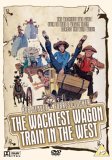![A Man Called Horse [1970]](/pictures/1001471.jpg) A Man Called Horse | DVD | (07/06/2004)
from £5.99
| Saving you £10.00 (166.94%)
| RRP
A Man Called Horse | DVD | (07/06/2004)
from £5.99
| Saving you £10.00 (166.94%)
| RRP American Indians were "cool" in 1970, the year A Man Called Horse made its vigorous, feverishly real, and occasionally shocking debut alongside Little Big Man and Soldier Blue. Unlike the latter two films, however, Horse is less an allegory for Vietnam-era America and more of a vision quest for historical identity. In one of his defining roles, Richard Harris plays an English aristocrat captured by Dakota Sioux in 1825. Over time, he adopts their way of life and eventually becomes tribal leader--but not before undergoing savage initiation rituals, the most famous of which involves being suspended by blades inserted beneath Harris's pectoral muscles. Horse looks clunky, quaint, and inadvertently demeaning in some respects today, but the film's Native-American milieu is at least defined on its own terms, making no concessions to familiar Western conventions. The real draw is Harris, whose performance has a soulful integrity. --Tom Keogh
![Duel At Diablo [1966]](/pictures/1001785.jpg) Duel At Diablo | DVD | (01/03/2004)
from £7.68
| Saving you £5.31 (69.14%)
| RRP
Duel At Diablo | DVD | (01/03/2004)
from £7.68
| Saving you £5.31 (69.14%)
| RRP Sidney Poitier and James Garner put in excellent performances as men on either side of the colour divide forced to fight side by side against the might of the Apache Indians...
![Barbarian Queen [1985]](/pictures/1002388.jpg) Barbarian Queen | DVD | (22/10/2007)
from £N/A
| Saving you £N/A (N/A%)
| RRP
Barbarian Queen | DVD | (22/10/2007)
from £N/A
| Saving you £N/A (N/A%)
| RRP No Man Can Posses Her. No Man Can Defeat Her. On the eve of her wedding the beautiful Amathea (Lana Clarkson) sees her world dissolve - her prince groom imprisoned her village razed her friends raped and slaughtered. Becoming the Barbarian Queen she vows revenge and retribution. With savage charm and deadly skill the Barbarian Queen and her female warriors entice then destroy their adversaries. Her power and beauty are legendary... she is the Barbarian Queen!
![A Man Called Horse (New to Blu-Ray) [2018] [Region Free]](/pictures/1146888.jpg) A Man Called Horse (New to Blu-Ray) | Blu Ray | (11/06/2018)
from £5.99
| Saving you £N/A (N/A%)
| RRP
A Man Called Horse (New to Blu-Ray) | Blu Ray | (11/06/2018)
from £5.99
| Saving you £N/A (N/A%)
| RRP In 1825, an English aristocrat is captured by Native Americans. He lives with them and begins to understand their way of life. Eventually, he is accepted as part of the tribe and aspires to become their leader.
 The Wackiest Wagon In The West | DVD | (05/07/2005)
from £15.93
| Saving you £-11.94 (-299.20%)
| RRP
The Wackiest Wagon In The West | DVD | (05/07/2005)
from £15.93
| Saving you £-11.94 (-299.20%)
| RRP Three episodes of ""Dusty's Trail"" (1973) coupled together into a feature film. In a similar situation to ""Gilligan's Island"" (1964) and even starring Bob Denver again Dusty is a bumbling assistant to Coachmaster Callahan on a stage and wagon. Thanks to Dusty's bungling they are soon seperated from the wagon train and lost in the wilderness. The characters parallel those of Gilligan's show.

Please wait. Loading...
This site uses cookies.
More details in our privacy policy